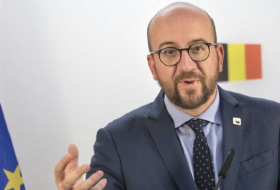Chanting “communists are murderers” and “we have had enough”, protesters held sheets of paper rolled up to resemble police batons in an expression of indignation over the installation of Zdeněk Ondráček, a Czech Communist party MP, as chair of the parliament’s general inspection of security forces commission.
The choice of Ondráček to head a sensitive committee overseeing police wrongdoing was confirmed in a parliamentary vote last week despite objections that he had served in a unit that beat up pro-democracy demonstrators in the 1989 Velvet Revolution before the fall of communism in what was then Czechoslovakia.
Monday’s protest coincided with simultaneous demonstrations in 10 other Czech cities and towns, including the second largest city, Brno. Protesters congregating in Prague’s Wenceslas Square – scene of the 1989 mass demonstrations that triggered the downfall of the former communist regime – focused their anger on prime minister Andrej Babiš, who is accused of facilitating Ondráček’s appointment in exchange for the support of 15 Communist party MPs for a government led by his ANO party, which is the biggest grouping in parliament but lacks sufficient numbers to form a majority.
Some said they feared for the future of democracy in the Czech Republic. “We feel democracy is under threat,” said Iva Vrbova, 53, a company manager who recalled taking part in the 1989 gatherings. “I stood here in the streets in 1989 and here we are again in exactly the same place – and for the same reason.
“He [Ondráček] is a man who beat ordinary people in the streets and now he wants to check and control police power in the Czech Republic. It’s horrible.”
Michal Mares, 58, a financial analyst and another veteran of the 1989 protests, said: “It’s a disgusting situation. Democracy is moving backwards, that’s why we are here.”
There were signs that the show of people power could force a U-turn.
Babiš – who himself has been identified as a secret police informer during the communist period, despite his denials – said he would push to have Ondráček’s appointment overturned, drawing criticism that he was merely bowing to public sentiment.
The controversy has coincided with the 70th anniversary of the communists’ seizure of sole power in Czechoslovakia in a coup that pushed the other parties in the coalition government out of office.
Ondraček has been defended by the current Communist party leader, Vojtěch Filip, who said his fellow MP “did nothing wrong” in fulfilling his police duties to suppress demonstrations.
The Guardian
More about: Czech








-1520334119.jpg)







































